Salvation and law
Q. What is the difference between unlawful and illegal?
A. The salvation of man
Common Law: the term is of English origin and is used to describe the juridical principles and general rules regulating the possession, use and inheritance of property and the conduct of individuals, the origin of which is not definitely known [1], which have been observed since a remote period of antiquity, and which are based upon immemorial usages and the decisions of the law courts as distinct from the lex scripta; the latter consisting of imperial or kingly edicts or express acts of legislation.
From the Catholic Encyclopedia
Jesus said unto him, ‘Thou shalt love the Lord thy God with all thy heart, and with all thy soul, and with all thy mind. This is the first and great commandment. And the second is like unto it, Thou shalt love thy neighbour as thyself’. On these two commandments hang all the Law and the prophets. [2]
Matthew 22:34-40
Jesus Christ: ‘Think not that I am come to destroy the Law, or the prophets: I am not come to destroy, but to fulfil’ [3]
Matthew 5:17
A new commandment I give unto you, That ye love one another; as I have loved you, that ye also love one another.
John 13:34
It is easier for heaven and earth to come to an end than for one dot or one stroke of the Law to lose its force.
Luke 16:17, The New English Bible
Let everyone be subject to the governing authorities, for there is no authority except that which God has established [4]. The authorities that exist have been established by God.
Romans 13:1, NIV
Love is the Law and the Law is Love
‘Thou shalt love the Lord thy God with all thy heart, and with all thy soul, and with all thy mind.
This is the first and great commandment. And the second is like unto it,
‘Thou shalt love thy neighbour as thyself’.
God’s Bible makes it clear that the above two commandments are the key to ‘all of the Law’:
On these two commandments hang all the Law and the prophets.
It therefore follows that man cannot make Law: he can only issue decrees, make rulings or pass legislation, which do not automatically have the binding force of Law or authority.
Since the Law is mandatory, any man-made system of legislation and constitution – known as civil law — must expressly include the Law to be properly constituted ‘law’, whether you call it maritime law, admiralty law, contract law, constitutional law, commercial law, trust law or some other name for a system of law. If a civil or legal code fails to recognise the Law, it is per se unlawful and cannot prevent you from insisting on your Common Law right to redress, if your rights are infringed.
When we use ‘law’, we are therefore describing a system founded on God’s laws yet extended to include legislation and other statutes and rulings. The ‘law’ part is created by God. The rest is created by man.
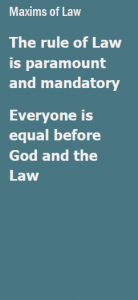 Man’s ‘law’
Man’s ‘law’
Because only God can make Law, it follows that the most honest interpretation of the word ‘laws’ must refer to the two commandments of God’s Law.
Where the phrase ‘man’s laws’ exists in the Bible, it must therefore be interpreted primarily as: ‘the laws man is bound by, the two commandments’ rather than ‘the laws created by man’ because only God can create law. Obviously, people use the word ‘laws’ to describe legislation created by man but this is inaccurate and wrong.
As the word of God — told through prophets and now the Christ – the Bible is a higher authority in law than any dictionary when it comes to interpreting the right meaning of words. The distinction is rehearsed many times in the Bible:
On the other hand those who rely on obedience to the law are under a curse; for Scripture says: ‘Cursed are all who do not persevere in doing everything that is written in the Book of the Law.’ It is evident that no one is ever justified before God in terms of law; because we read, ‘he shall gain life who is justified through faith’. […]
Christ brought us freedom from the curse of the law.
Galatians 3:10-12, The New English Bible
To be obedient to the two commandments of Love written in the Book of the Law — also known as the Bible — is an expression of faith, which leads to redemption. To be unquestioningly obedient to legislation – whether religious, biblical or secular — is an expression of fear, indicative of the mind-set of the slave, the man who has given up determining right and wrong for himself, the man who all too easily allows himself to be manipulated. And there is no one more dangerous than a slave who wrongly believes he is free. The test of the man will be though how he reacts when he is shown the evidence of his slavery.
Because of this, a vigorous ‘democracy’ can all too easily turn into ‘mob rule’. It is not those who know they practise evil who pose the greatest threat. It is men like Tony Blair who commit evil and imagine they are doing good because they have legislation created by man on their side – but not Law created by God.
The Bible makes it abundantly clear that law, small ‘l’, is legislation, a temporary measure introduced until the arrival of the ‘issue’, which from context can only be read in the first instance as ‘Christ’:
Then what of the law? It was added to make wrongdoing a legal offence. It was a temporary measure pending the arrival of the ‘issue’ to whom the promise was made.
Galatians 3:19, The New English Bible
Any use of the word ‘law’ — where there is no method of determining rights under the Law — is misrepresentation and fraud.
Love in law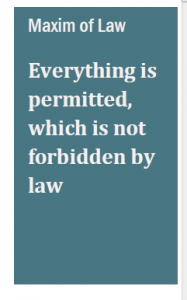
Under the Law, you are a creation of God, a soul alive and incarnated as a flesh and blood man, born free of any duty to any other man or corporation, with free will and absolute responsibility for his actions before God.
In law, these commandments are expressed as:
Your duty to God, which comes first – the ‘great commandment’
Your duty to humanity, which follows
Your duty to your family [5] is part of your duty to humanity. Where your duty to humanity and your duty to your family clash, your duty to humanity prevails. In a global culture, those far away can be affected by our actions so your ‘neighbour’ could be working in a sweatshop in Asia, especially if he has made the cheap jeans you are wearing. Your duty to humanity does not take precedence over your duty to God.
Spiritually, you are on a soul journey in which your duty is to be like God: to be as loving, wise and compassionate as God. Of those three higher qualities, the only one we can hope to emulate in this world is Love. We cannot have God’s wisdom or compassion but we can love like God: unconditionally. The Law reflects this. It does not impose a duty on you to be wise or compassionate – those are goals on the journey. It does though impose a duty we are all capable of: Love, which includes a love of Justice and Truth, the bedrock on which Justice is founded.
The Second Commandment
If you are observing the sovereign law laid down in Scripture: ‘Love your neighbour as you love yourself’, that is excellent. […] For if a man keeps the whole law apart from one single point, he is guilty of breaking all of it.
James 2:10-11, New English Bible
Although the above passage refers to ‘Love your neighbour…’as the sovereign law, it is clear from context and reason that this refers to the Old Covenant with Moses [6]. The great commandment to ‘Love God’ comes above the normal commandment of ‘Love your neighbour…’ precisely because it is referred to as ‘great’ in the Bible itself. In other areas, the Bible, the Oath and insurance contracts make it clear that God is a higher authority than man so it is axiomatic that your duty to God comes above your duty to humanity. Additionally, the duty to God includes a duty to humanity as man is a creation of God. In any case, if you live in love, you will love all aspects of God’s creation because love is unconditional and not selective.
As the biblical Christ makes clear in the Sermon on the Mount the commandment of ‘Love your neighbour…’ is not an excuse to hate your enemy. The second commandment is often not quoted in full. The ‘…as you love yourself’ is often left understood. Yet, it is imperative that you learn to love yourself before you can effectively serve God and humanity.
If more activists and religious people looked into their own hearts rather than constantly seeking to blame others – usually as a result of their own ideological bigotry — then we could solve the world’s problems overnight.
This commandment also provides an apparent get out clause for those inclined to try and cheat God and karma, when you hate yourself as you hate your neighbour. In other words, you might beat or torture a man and claim in defence that you would expect the same, if you were his prisoner. However, the validity of this interpretation is easily refuted. The second commandment as it is rendered in the Book of John more clearly expresses the Law of Love:
A new commandment I give unto you, That ye love one another; as I have loved you, that ye also love one another.
It is simply a duty to love each other. ‘Hate your neighbour as you hate yourself’ as a philosophy is also repudiated by the great commandment’s exhortation to ‘Love God’, which by reason also applies to that which he has created: each individual man.
 These perverted and self-serving interpretations of the Bible will in any case be more quickly dismissed under the New Covenant, as God the Son will be there to correctly interpret the will of God the Father. The motivation for misinterpreting God’s Law is usually to avoid taking responsibility for our actions. To be absolutely clear, you are responsible for your actions and words [7]. In its simplest form, divine justice or Karma means: ‘What you put out, you get back’.
These perverted and self-serving interpretations of the Bible will in any case be more quickly dismissed under the New Covenant, as God the Son will be there to correctly interpret the will of God the Father. The motivation for misinterpreting God’s Law is usually to avoid taking responsibility for our actions. To be absolutely clear, you are responsible for your actions and words [7]. In its simplest form, divine justice or Karma means: ‘What you put out, you get back’.
Love and you add to the sum total of love in the world. Hate and you add to the sum total of hatred in the world. It is that simple.
Fortunately, the karma doesn’t kick in straight away. The universe gives you a period of grace to consider what you have done. The good news is that the love you bring to the universe is never destroyed but you can destroy the hatred you’ve created by learning the lesson of heartfelt contrition. Once you’ve understood you have done wrong, the karmic slate is wiped clean, your sins – self interest at the expense of the rights of others – can be forgiven in law (but as the Bible makes clear, only by Christ and a process of contrition).
If you don’t learn the lesson, the universe will beat you with a big stick until you do. The universe does not therefore punish you for being a torturer. It punishes you for failing to realise: that torture is wrong. And the chances are – under the philosophy of ‘Do as you would be done by’ – you will be tortured until you learn the lesson.
Remember: the aim of the spiritual journey is to be like God – loving, kind, wise and compassionate from which come Unity, Love, Truth, Justice, Freedom and Peace.
If you do not believe in God (or indeed, love) then you have an even greater duty to Truth and Justice and are still bound by the Golden Rule: ‘Do as you would be done by’, the second commandment in its alternative biblical form.
The Law and your rights
Although not expressly stated in God’s Law, rights result from the duties set out in the Law. If you have a duty to love your neighbour, then you will automatically respect his right to, for example, privacy or free speech or to hold property. The same argument provides the right to trial by jury or judgment by your peers.
If you were on trial, who would you trust to get at the truth, your peers or a paid state lackey in the form of a judge who is paid extra for putting you in prison? If you would choose trial by jury, then why would you deny it to your neighbour?
Your neighbour though has no right to your love. It is therefore clear that a duty takes precedent over a right. No one of course has rights over God. Since your rights are part of the Law of God, they are ‘God-given’. That which is given by God cannot be taken away by the lower authority of man.
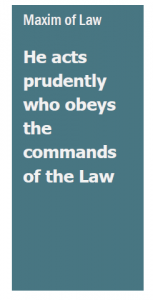 The Law is the expression of the spiritual teaching common to just about all creeds and religions to obey God and carry out His will through unconditional love (although all too often forgotten by so-called advocates or followers):
The Law is the expression of the spiritual teaching common to just about all creeds and religions to obey God and carry out His will through unconditional love (although all too often forgotten by so-called advocates or followers):
And he took the book of the covenant, and read in the audience of the people: and they said, All that the LORD hath said will we do, and be obedient.
The staff shall not depart from Yehuda, nor the sceptre from between his feet, until Shiloh comes, and the obedience of the people be his.
Alternative Jewish translation from Bereshit or Genesis 49:10
Rebellion against tyrants is obedience to God
US Founding Father, Thomas Jefferson
Since this commandment is common to decent human beings across the world, it is also known as Common Law — but should not be confused with judge-led rulings created in medieval England known as ‘common law’ — or Natural Law. [8]
The Common Law is the law of common sense. Who other than a psychopath or sociopath would:
- actively set out to harm the rights of a fellow man?
- fail to consider how his actions or lack of them might harm the rights of others?
- continue his action in the full knowledge that he was infringing the rights of another man?
Israel, the Jews and the Law
So what about ‘the Law’ as set out in the Torah, the Jewish Bible or the first five books of the Old Testament and the ‘ten commandments’? The word ‘Torah’ translates as ‘instructions’, not as ‘Law’. The so-called ‘ten commandments’ are never referred to as such in the biblical text (although editors have unhelpfully inserted headings like ‘The Ten Commandments’). The Torah does refer to God’s statutes, Law and judgments but does not distinguish between them.
It does though include what are later referred to as commandments in the New Testament:
And thou shalt love the LORD thy God with all thine heart, and with all thy soul, and with all thy might.
Thou shalt not avenge, nor bear any grudge against the children of thy people, but thou shalt love thy neighbour as thyself: I am the LORD.
The ten ‘commandments’ nevertheless remain the cardinal rules for good conduct and spiritual advancement (see The ‘Ten Commandments’ explained).
The nation of Israel
The nation of Israel famously has no written constitution. However in 2004, Menachem Elon, deputy president of the Supreme Court of Israel, made it clear where constitutional authority comes from in the state of Israel. He said:
Everything in the Babylonian Talmud is binding on all Israel. Every town and country must follow all customs, give effect to the decrees, and carry out the enactments of the Talmudic sages, because the entire Jewish people accepted everything contained in Talmud.
The sages who adopted the enactments and decrees, instituted the practices, rendered the decisions, and derived the laws, constituted all or most of the Sages of Israel.
It is they who received the tradition of the fundamentals of the entire Torah in unbroken succession going back to Moses, our teacher.
This is an admission that the Talmud – a collection of commentaries — is based on the Torah and the teachings of Moses. As we have already seen, the Torah contains the two commandments of the Law – Love God and Love your neighbour as yourself – even though they are not specifically referred to as ‘commandments’ in the Old Testament. Where the Talmud and the Torah clash, it is axiomatic that the Torah as part of the Bible – the word of God and his two divine commandments – prevails over the Talmud – the work of men.
In the biblical sense, the ‘nation of Israel’ is, primarily, those who are bound by God’s Law. ‘Israel’ means ‘those who struggle with God’.
- The Law is paramount and mandatory.
- The Law treats everyone equally.
- Man cannot create Law or laws.
- The Law of God exists as man cannot take away that which God, a higher authority recognised in the oath and in insurance contracts, has given.
- An individual man has higher authority than any corporation.
The Law in practice
If ever the Law of God and man are at variance, the former are to be obeyed in derogation of the latter. [9]
That which is against Divine Law is repugnant to society and is void.
He who becomes a soldier of Christ has ceased to be a soldier of the world. [10]
Maxims of Law
Because of the mandatory nature of the Law, any code or constitution drawn up — or any statute passed — has to have as its basis the intention to better protect ‘the rule of Law’ and freedom rather than undermine it. In the event of this going wrong (because legislation is created by deeply fallible men) that code has to recognise your right to:
i. claim damages or redress for interference with your rights as they are expressed implicitly or explicitly under any code;
AND
ii. your right to reject any piece of legislation or the entire code or constitution as it does not accord with your duty of conscience to God, enshrined in the first commandment of the Law.
In the past, those who rejected the laws of England and the government of the day were known as ‘free men’, which included women. (In this testament, the term ‘man’ also applies to woman).
Reality check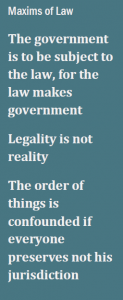
Acts of Parliament, other statutes, legislative instruments, judicial precedents and rulings, by-laws, the US constitution, articles of association, the Lisbon Treaty, even the membership rules of the local golf club or Green party are codes of rules — as opposed to Law — subject to the Law.
You can no more be bound by the laws of the UK than you can be by the rules of Haslemere Golf Club. You have no more duty to the government of the UK than you do to the Politburo. Imagine if Haslemere Golf Club wrote to you saying you had not been paying your subscription even though you weren’t a member. You would rightly ignore the request on the grounds that you were not a member and therefore could not be bound by the rules of the club. In other words, the club has no jurisdiction over you.
If you made that clear to the club and it continued to hassle you for subs insisting it did have authority over you, you would of course consider this as harassment, fraud and extortion, wouldn’t you?
Consent makes the law. A contract is a law between the parties, which can acquire force only by consent.
That which seems necessary for the king and the state ought not to be said to tend to the prejudice of liberty of the ekklesia. [11]
Maxims of Law
Now, suppose you were a member of the club and it put the green fees up prohibitively or introduced a dress code you did not agree with. You would of course have a perfect right to resign and no longer pay your subscription. Anyone disagree? Again, you would consider it a breach of your rights and an abuse of perceived power if Haslemere Golf Club then insisted that you continued to be a member and sought to reprimand you under its rules.
Well, exactly the same principles apply to the society of the UK and its rules. Under the Law, you can no more be compelled to obey the rules of the UK whether it is parliamentary legislation, executive orders or ministerial decree — than you can be compelled to obey the by-laws of Haslemere Golf Club. Even if you have contracted to join the society of the UK, you can leave whenever you wish.
And there is good reason for this. Think of just some of the unjust laws passed and prosecuted by man:
- The Catholic Church allowed torture under laws relating to the Spanish Inquisition.
- English law allowed for torture and for men to be hanged, drawn and quartered.
- Until the early 19th century, Catholics were discriminated against under English law.
- In Nazi Germany, laws allowed the persecution of the Jews and other minorities the regime thought unacceptable, laws which were held to be constitutional by the senior judges of the day.
- Laws have allowed men to keep slaves or to discriminate against black people, women or homosexuals.
- When the slave trade was abolished in the UK in 1807, it was sneaked through parliament, in the face of opposition from legislators backed by those profiting from the slave trade.
- The illegalisation of the hemp plant has caused mass starvation, including 75million deaths a year through hunger; and the pollution of our air, water and soil and so on.
- The laws of Babylon consistently discriminate against male humans, as for example, with the retirement age.
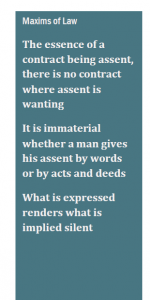 In more recent times, the UK and the US have prosecuted unjustified wars in Iraq and Afghanistan — which have created even greater threats to the security of the people of the world – yet man’s legislation has failed to bring anyone to justice for the murder of more than two million people.
In more recent times, the UK and the US have prosecuted unjustified wars in Iraq and Afghanistan — which have created even greater threats to the security of the people of the world – yet man’s legislation has failed to bring anyone to justice for the murder of more than two million people.
- Any code of government or constitution is a form of contract, governed by civil and maritime law – the law of the sea as opposed to the Law of the land – which has to include God’s Law to be lawful.
- It therefore follows that without the consent of a man, statutes cannot carry the force of law.
- No one can be forced to enter into a contract against his will or be held by the terms of a contract which conflicts with his conscience.
- No one is obliged to accept a benefit against his consent.
- Consent can be implied and understood by silence. Assent cannot. Assent to an offer requires action – be it acts, deeds or words.
- There is an enormous difference between consent and ignorance.
The ‘Ten Commandments’ explained
Although we refer to the ‘Ten Commandments’, the Old Testament never refers to any such thing. Exodus 20:2-17 and Deuteronomy 5:6-21 have similar lists of instructions [12], which come from ‘the Lord, your God’ and begin with the ten rules we know and love.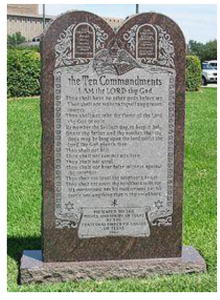
You shall have no other gods before me
The One True God is Jesus [13], spelt Yod Hey Vav Hey in the sacred letters, or IHVH. The bit forgotten by many is ‘before me’. If there is only one God, why doesn’t he make it clear here by stating: ‘There is no point in worshipping other gods as they don’t exist’.
Although Jesus is supposedly revered by so-called Christians, their churches venerate Mary, spelt Alef Hey Yod Hey or AHIH, the god who gave Moses the Torah or ‘code of laws’, and as Allah gave Mohammed the Quoran; the god who incarnated as Constantine, the Roman Emperor who played a role in the formal adoption of a canonical Bible at the Council of Nicea in 325 AD, and Arkhenaten, the pharaoh who tried to introduce monotheism to Ancient Egypt.
In just about every pantheon, there is one god who is revered way above all others [14]. Although he – inevitably this god is referred to as male – has been known by many names over the millennia, his name is Jesus.
While man has acknowledged that other gods exist (as does the Bible in this ‘commandment’) and has sought their guidance, the vast majority of societies, religions and nations have recognised the authority of Jesus as the One True God, no matter what they have chosen to call him.
As he is the God of Love – he chooses to love us unconditionally – why would anyone have a problem respecting his authority by doing his will? Only through love do we find truth. And only by arriving at the truth can we do justice.
If you are an atheist, you will need to acknowledge the free will of man and the responsibility any man has for his actions. You will need to understand that God has never picked up a gun and killed anyone. Only misguided people have done that. You are answerable to your conscience and will need to look at where man-made legislation has got us.
You will also need to ask yourself what problem you have with the principles of unconditional love and ‘Do as you would be done by’.
You shall not bow down to false idols or graven images
The journey to Christ, Messiah or Hero consciousness is one of the heart. The veneration of human personalities and/or physical objects will not take you on that journey. Fans of celebrity culture: take note. Under the law of (non) attachment on the soul journey, any attachment to an object; a man or woman; or certain principles will mean that karma will take it from you to end the attachment. If perversely, you have an object or a relationship to which you are not attached, God will in most cases allow you to keep it.
You shall not take the Lord’s name in vain
This is another much misunderstood rule. Saying ‘Jesus Christ’, ‘Christ on a bike’, ‘Jesus H Christ’, ‘Oh, God’, ‘God Almighty’, ‘God alive’ etc is not taking the Lord’s name in vain. You are in fact calling on God’s help which he likes. ‘God damn’ is all right so long as it is not an imprecation to damn anyone or anything.
‘Taking the Lord’s name in vain’ more properly refers to not observing the oath to God or using God as a justification for anything which God would not approve of, for example waging war in the name of God or carrying out torture in the name of God as the Spanish Inquisition did on behalf of the Pope.
You shall observe the Sabbath Day
In terms of days of the week, the Sabbath is Saturday, not Sunday. As the seventh day of the week, it represents the seventh day of creation or the seventh age of the universe, also known as the age of the Messiah or Christ, when God rests after the six ‘days’ of creation. As the universe is around 16 billion years old, each ‘day’ is on average 2.5125 billion earth years.
This rule is there to remind you that the world is changing. At the end of 2012, we enter the 7th age. Each soul incarnated here has to prepare for that change.
On the level of the week, it means that Saturday is a day of leisure — as opposed to work. Due to the demands of modern society, either vital work or those who provide the leisure for others – for example, footballers — inevitably needs to be done on a Saturday. These men and woman can observe the Sabbath on Sunday.
You shall honour your father and mother
This refers to the Holy Father and Mother or Jesus and Gaia, not to your blood parents. Children are the creation of God – why do you think a child is ‘conceived’ rather than ‘made’? Blood parents are the stewards of the child and should never think that a child belongs to them or seek to make the child in their likeness. Never forget your first duty is to God, not your spouse and children. You best serve them — and the wider good of man — by observing your duty to God.
By honouring the Holy Father and Mother, you seek to balance the masculine and feminine – neither of which should be confused with the human male and female — within yourself. In general, this refers to the need to balance the active with the passive and the needs of men and women in society. Balance of the genders is not generally achieved by having an equal number of men and women doing the same job.
You shall not murder
In some texts, this is translated as ‘You shall not kill’. Any deliberate or foreseeable killing of another man is unlawful, particularly the death penalty when carried out by men or women and abortion, with the proviso that the potential mother’s rights are balanced with the foetus’s right to life. This is in effect what happens now as I have no desire to drive women to backstreet abortionists. Abortion though should never be a lifestyle choice as it was in the Soviet union.
If a man assents to his own death, by for example assisted suicide, it is his right so long as procedures are observed.
Some have taken this ‘commandment’ to mean that man cannot lawfully take the life of an animal. However, the Biblical Jesus Christ makes it clear that he eats meat (as did the Buddha and as does the current Dalai Lama) so this ‘commandment’ does not make the killing of animals unlawful. Out of respect for God’s creation, any man has a duty to ensure that animals do not suffer unnecessarily so the worst aspects of factory farming, fox hunting with dogs, bear-baiting and cock-fighting among others are unlawful.
You shall not commit adultery
This is perhaps the most misrepresented ‘commandment’ of all time and is often used to justify sanctions or condemnation of those who have sexual relations outside marriage. If you married in church and took a vow before God, then you violate that vow by having a sexual relationship outside that marriage – including cyber sex. Similarly, if you are not married and have a sexual relationship with a man or woman who has taken a vow before God, you help to violate that solemn binding vow.
Under the New Covenant, any man or woman is free of vows made before God to another man or woman.
As long as you live in unconditional love, there is no sex without love so you are entitled to have sexual relations with any consenting, physiologically mature man or woman or with anyone who consents of a similar physiological maturity.
God wants you to have as much giving sexual relations with as many people as you see fit because having an orgasm is the simplest way of touching God.
Since your first duty is to God, who wants you to be happy by having loving, giving sex then it is inadvisable to enter into an exclusive long term relationship with another man or woman because the danger is you will put them before God.
You shall not steal
It is unlawful to steal from another man. This ‘commandment’ does not refer solely to material objects and is subject to the principle of responsible use. This means that no man shall steal another man’s time or freedom or work and will not be held to account if he takes something vital for his own existence that is not in imminent use or need by another man.
This ‘commandment’ also covers usury as by creating false value through money, which should only be a token to ease exchange of goods, you inevitably eat into the pie of real value, which means that you steal real wealth off its creators and those least likely to be able to defend themselves.
As corporations have no souls and have what they have as a result of usury, a breach of the Law, then no man ever steals off a corporation. In order to bring down the rule of corporations, it is more akin to a duty than a crime to take from them without payment.
You shall not bear false witness
This is not quite the same as an imperative to tell the truth. God accepts that if we told the absolute truth all the time, society would barely function. Imagine if your girlfriend asked if she looked good in a new frock and you thought she looked like a sack of spuds and had by your duty to God to tell her that. To bear false witness means to lie for reasons of ego or to wrongly implicate another. You also bear false witness when you lie by omission, even if every fact you have related is true. On another level, it means to recognise and support a false Messiah, Christ or ‘witness’, as the role is referred to in the Book of Revelation.
You shall not covet your neighbour’s wife’s ass
Never be jealous or envious of anyone for any reason. Be grateful for what you have because you have it by the grace of God.
The Sermon on the Mount
The real Sermon on the Mount, Roseberry Topping, Nunthorpe, 1st August 2008 and Sermon on the Mount by Carl Heinrich Bloch. Note the position of Christ’s fingers, part of a code shared by secret societies
‘For I tell you that unless your righteousness surpasses that of the Pharisees and the teachers of the law, you will certainly not enter the kingdom of heaven’.
Perhaps the simplest clarification of the Law and best spiritual practice comes in the New Testament’s Sermon on the Mount [15]. In the beatitudes at the beginning, Christ makes it absolutely clear:
Blessed are those who hunger and thirst for righteousness, for they will be filled.
Blessed are the merciful, for they will be shown mercy.
Blessed are the pure in heart, for they will see God.
Blessed are the peacemakers, for they will be called children of God.
Blessed are those who are persecuted because of righteousness, for theirs is the kingdom of heaven.
Blessed are you when people insult you, persecute you and falsely say all kinds of evil against you because of me.
Rejoice and be glad, because great is your reward in heaven, for in the same way they persecuted the prophets who were before you.
You are the salt of the earth. […] You are the light of the world.
Matthew 5:6-14, NIV
For the avoidance of doubt, ‘righteousness’ means justice, the correct outcome of any process of law, arrived at only by first establishing truth. Those who thirst for justice or are persecuted for standing against injustice — in the same way as the prophets (or the previous incarnations of the Jesus soul) — will find their way to heaven: the New World, post-2012. In other words, those who stand up for God’s Law, the Law of Love, will find salvation.
‘Do not think that I have come to abolish the Law or the Prophets; I have not come to abolish them but to fulfill them. For truly I tell you, until heaven and earth disappear, not the smallest letter, not the least stroke of a pen, will by any means disappear from the Law until everything is accomplished.
‘Therefore anyone who sets aside one of the least of these commands and teaches others accordingly will be called least in the kingdom of heaven, but whoever practices and teaches these commands will be called great in the kingdom of heaven.
‘For I tell you that unless your righteousness surpasses that of the Pharisees and the teachers of the law, you will certainly not enter the kingdom of heaven’.
Matthew 5:17-20, NIV
Those who blindly follow ideological [16] dogma will not. Similarly, those who
- pray ostentatiously; [17] or
- conduct spiritual practices like acts of charity or fasting for public display [18].
In each case, Christ does not condemn the actual practice but the motivation behind it – to impress other men when the spiritual journey is a private and individual relationship between you and God. The biblical Christ also warns of the dangers of the following, which inevitably lead to the violation of God’s Law:
- Anger

- Materialism
- Worry
- Conditional ‘love’ [19]
- Judgementalism
- Hypocrisy
There is no such thing as righteous anger. Don’t worry. Do something, even if it is just a prayer!
If you are truly motivated by love, you feel it in your heart. So you are not even tempted to ‘sin’ [20].
But which man finds himself there, all the time?
‘We hold these truths to be self-evident…’
Footnotes
[1] It is curious that the Catholic Church should not definitely know that the English Common Law comes from the Bible.
[2] The same commandments are laid down in the Book of Mark, 12:28-32
[3] The Greek word used also means to ‘complete’.
[4] You only owe a duty to the authority of God or an authority following God’s Law
[5] Your ‘family’ may of course be your nation, tribe or football team among others.
[6] This does not mean that your duty to God did not exist under the Mosaic Covenant. It just meant that it was not determinable at law, unless you had formally sworn your duty under oath as, for example, when giving a witness statement in court. In that case, you can be charged with perjury for failing to tell the truth, the whole truth and nothing but the truth, as you swore to do before God.
[7] Karma/God does not judge you for thinking. Only untrusting girlfriends and wives seek to censure their partner’s thoughts.
[8] Some – mainly atheists and anti-Messianic Zionists — have claimed that the latter is the dog-eat-dog law of the jungle
[11] Ekklesia means ‘the congregation [of Christ]’. In this case, it refers to anyone following the Law of God
[12] There are in total over 600 of these instructions
[13] Not to be confused with Jesus Christ, an inaccurate translation of ‘Yeshua Messiach’, the incarnation of Jesus in this world.
[14] This is known as henotheism -– as opposed to monotheism or polytheism.
[15] The Gospel of Luke includes a Sermon on the Plain, which contains similar ideas, see Luke Chapter 6 onwards. For the real Sermon on the Plain, see Messiah at Guildford Cathedral, www.youtube.com/shaylertv
[16] Religion here is a sub-set of ideology. Originally, ‘religion’ meant ‘to bind together (again)’ with God. Since religions end up insisting on the adherence to rules rather than God and love, ‘religion’ has come to mean ‘binding people together’ with a common code of rules. In this sense, religion is a form of groupthink, like democracy.
[18] Matthew 6:1, Matthew 6:16
[19] ‘Love’ by definition is unconditional. If there are conditions, it ain’t love.
[20] Sin = Self-interest, now. The opposite is courage, honour and integrity

